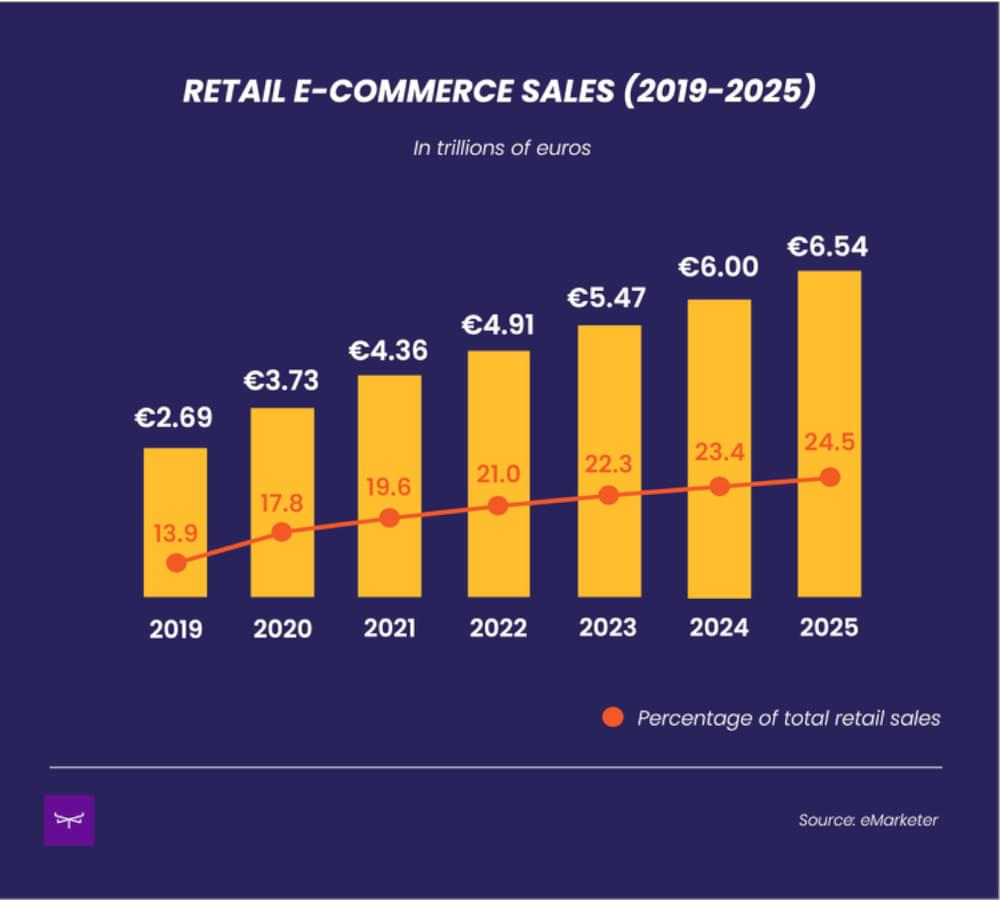In today’s fiercely competitive e-commerce landscape, staying ahead of the game requires innovative strategies and actionable insights. One such strategy gaining popularity is large-scale web scraping – a powerful tool that can revolutionize your business. So, how can web scraping on large scale help your e-commerce business?
With the ability to scrape and analyze vast amounts of data in real-time, large-scale web scraping provides businesses with a competitive advantage. By e-commerce web scraping, your e-commerce business can optimize pricing strategies, enhance product offerings, improve customer experiences, and identify opportunities for expansion.
The difference between Large-scale and regular web scraping is simply the difference in absolute volume. While regular web scraping benefits your e-commerce business, let’s discuss how large-scale e-commerce web scraping helps you maximize your business.
Related Read: Large-scale Web Scraping vs Regular Web Scraping
What benefits do large-scale e-commerce data extraction provide over normal e-commerce web scraping?
Large-scale e-commerce data extraction offers several benefits over normal e-commerce web scraping due to its ability to handle large volumes of data and provide more comprehensive insights. Here are some advantages:
Benefit 1: Comprehensive Product Catalog:
Large-scale scraping allows for extracting extensive product catalogs from e-commerce sites, enabling businesses to gather vast product data for market analysis, competitive intelligence, and pricing strategies. Standard scraping may only provide access to a limited subset of products.
For example, a fashion e-commerce site sought to improve its customer experience and drive conversions by gaining deeper insights into customer behavior and preferences.
Problem:
The e-commerce site lacked comprehensive data on customer interactions, purchase history, and product reviews, hindering its ability to understand customer preferences, identify trends, and effectively provide personalized product recommendations.
Solution:
The fashion e-commerce site implemented a large-scale web scraping solution to gather real-time data on customer behavior, purchase history, and product reviews from its platform. This solution enabled them to analyze customer interactions such as product views, add-to-cart actions, and purchases, providing valuable insights into individual customer preferences. This led to increased customer engagement, higher click-through rates, and higher average order value. Additionally, the site experienced enhanced customer satisfaction, ultimately driving more conversions and boosting overall business performance.
Benefit 2: Real-time Market Insights:
With large-scale scraping, businesses can continuously monitor changes in product availability, pricing, and customer reviews across a wide range of e-commerce platforms. This real-time data allows for agile decision-making and quick responses to market trends, giving companies a competitive edge.
For example, a mid-sized e-commerce company specializing in consumer electronics wants to stay ahead of the competition by closely monitoring market trends, pricing fluctuations, and customer sentiments across various online platforms.
Problem:
The company needs help to gather timely and comprehensive data on product availability, pricing dynamics, and customer feedback from multiple e-commerce websites.
Solution:
Implementing large-scale web scraping techniques, the company sets up automated systems to continuously monitor changes in product listings, prices, and customer reviews across a diverse range of e-commerce platforms such as Amazon, eBay, Walmart, and Best Buy.
Benefit 3: Scalability and Performance:
Large-scale scraping solutions are designed to handle high volumes of data and concurrent requests efficiently. They use distributed architectures, parallel processing, and caching to ensure scalability and speed, to scrape big e-commerce sites fast and reliably.
For example, A data analytics firm specializing in market research aims to provide clients with up-to-date insights into pricing trends, product availability, and competitor strategies across multiple e-commerce platforms.
Problem:
The data analytics firm faces challenges in gathering timely and comprehensive data from large e-commerce sites due to limitations in the scalability and performance of its existing web scraping infrastructure. As the volume of data increases and concurrent scraping requests surge, its systems struggle to handle the load efficiently, resulting in latency issues and occasional downtime.
Solution:
The data analytics firm adopts enterprise solution by Crawlbase to address scalability and performance challenges. Applying distributed architectures, parallel processing techniques, and caching mechanisms to its scraping infrastructure, allowing it to easily handle high volumes of data and concurrent requests.
Benefit 4: Robustness and Reliability:
Large-scale scraping solutions are equipped with robust error handling, retry mechanisms, and monitoring tools to ensure the reliability of data extraction processes. They can withstand changes in website layouts, intermittent network failures, and other challenges commonly encountered during web scraping, providing businesses with consistent and reliable data feeds.
For example, Retail Analytics, a data analytics company, relies on web scraping to gather pricing information, product details, and customer reviews from various e-commerce websites. However, they face challenges due to occasional website downtime, network issues, and changes in website layouts affecting their data extraction process.

Problem:
Occasional website downtime disrupts their scraping operations, leading to incomplete datasets. Intermittent network connectivity issues affect data accuracy and reliability, resulting in failed scraping attempts. Moreover, frequent changes in website layouts necessitate constant adjustments to scraping scripts, causing delays and inconsistencies in data extraction.
Solution:
Retail Analytics implements a large-scale scraping solution equipped with robust error handling mechanisms and automated monitoring capabilities to address the challenges its web scraping operations face. This solution incorporates robust error handling to detect and gracefully handle errors like HTTP and connection timeouts, ensuring minimal disruption to data extraction. Additionally, it includes automatic retry functionalities, reducing the impact of network issues on data reliability by automatically retrying failed scraping attempts using predefined strategies. Moreover, the solution integrates website monitoring tools that track changes in website layouts and detect website downtime in real time, facilitating prompt adjustments and minimizing disruptions in data extraction.
Overall, large-scale scraping enables businesses to gain deeper insights into e-commerce markets, optimize their pricing and product strategies, and stay ahead of the competition in today’s fast-paced digital landscape.
Common challenges and limitations of e-commerce web scraping at large scale.
Let’s discuss the main challenges and limitations for web scraping e-commerce sites:
- Data quality and accuracy: Not all data available on the web is reliable. Businesses need to ensure that the scraped data is accurate and up-to-date. Inaccurate or outdated data can lead to poor decision-making and wasted resources.
- Website structure changes: Websites often undergo changes in structure and design, which can break web scraping scripts. Businesses need to regularly monitor and update their scraping scripts to adapt to these changes.
- IP blocking and legal issues: Websites may block IP addresses that are engaged in scraping activities to protect their data and prevent unauthorized access. Additionally, there may be legal and ethical considerations when scraping data from specific sources. Large-scale scraping may encounter more frequent IP bans and CAPTCHA challenges, leading to disruptions in data collection and decreased scraping efficiency. Businesses need to ensure compliance with legal and ethical guidelines when implementing web scraping strategies.
- Scalability and performance: Large-scale web scraping requires robust infrastructure and efficient scraping techniques to handle large volumes of data. Businesses need to consider the scalability and performance aspects of their scraping strategies to ensure smooth operations.
- Dependency on Website Stability: Large-scale scraping relies heavily on the stability and reliability of the targeted e-commerce websites. Any changes in website structures, content delivery mechanisms, or downtime can disrupt scraping processes and affect data integrity.
Therefore, choosing the right tool for large-volume data scraping, especially for e-commerce sites, is very important. Scroll down to learn how to choose the right enterprise solution for your business.
Choosing the right tool for large-scale projects
Choosing the right tools for scraping large-scale e-commerce sites like Amazon, eBay, and Walmart is crucial. There are a variety of web scraping tools available, each with its own features and capabilities. Here are some factors to consider when selecting web scraping tools for large-scale projects:
Scalability: Ensure that the tools can handle large volumes of data and scale as your business grows. This is particularly important for e-commerce businesses that deal with a vast amount of product data. Basically, tools with Enterprise solutions.
Robustness: Choose tools that can handle website changes and adapt to dynamic web pages. This ensures the longevity and effectiveness of your scraping projects.
Data extraction capabilities: Evaluate the tools’ ability to extract the specific data you need for your e-commerce business. This includes product details, pricing information, customer reviews, and more. For example, if you’re looking for an Amazon scraper, then make sure that the scraper extracts details of Amazon search page, Amazon reviews, Amazon ratings, Amazon best sellers, Amazon PPC ads, Amazon prices, and download Amazon Images along with scraping Amazon product data.
Scraping Capabilities: Some web scraping tools have limitations over some sites and don’t offer scraping solutions to those sites. Consider tools that allow scraping all websites. One such tool is Crawlbase Crawling API, which allows you to scrape any kind of website.
Final Words:
I hope this article gave you insights on scraping large-volume data from e-commerce sites and suggested the tools to consider for scraping e-commerce sites on a large scale.
If you’re just starting to scrape your project, we have written e-commerce scraping tutorials for you. Find the links below:
How to Scrape E-commerce website
How to scrape Walmart Product data
How to scrape Walmart sponsored ads
How to scrape Walmart bestsellers
How to scrape Walmart search pages
If you’d like any help in scraping e-commerce sites, feel free to contact our support team.











